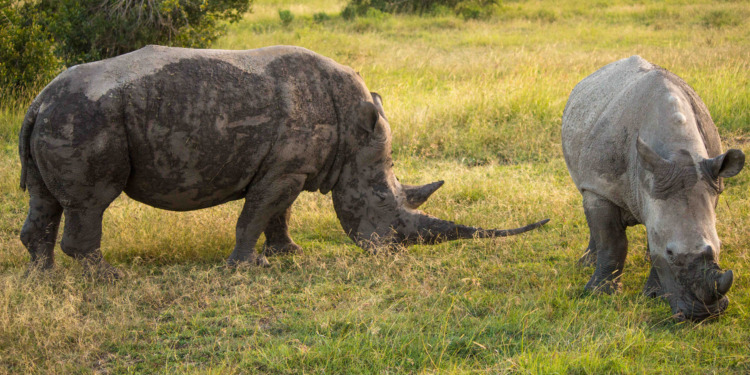On Sept. 4, 2023, the African Parks NGO announced that they would rewild the 2,000 white rhinos — which represent roughly 15% of their population — that they bought from “Platinum Rhino,” a 7,800-hectare property in South Africa.
Platinum Rhino was built as the world’s largest rhino farm in 2009 by former billionaire John Hume. Although the farm was doing well initially, Hume was forced to put it up for auction on April 26, 2023, after the monthly expenses reached almost €400,000 according to auction documents.
The auction ended in May 2023; African Parks has not disclosed the price they paid for the rhinos, but the bid started at €9.3 million.
The NGO, which “takes on the complete responsibility for the rehabilitation and long-term management of national parks in partnership with governments and local communities,” was able to pay such a high sum thanks to the support of emergency funds and the South African government.
African Parks aims to rehome all 2,000 rhinos in the wild within ten years.
In a historic moment for wildlife protection, conservation group African Parks plans to release 2,000 southern white rhinos into the wild.
This would mark one of the largest continent-wide rewilding programmes for any species. https://t.co/aoDXSPz61b
— BBC News Africa (@BBCAfrica) September 5, 2023
Peter Fearnhead, the CEO of the NGO, stated that “African Parks had no intention of being the owner of a captive rhino breeding operation with 2,000 rhinos. However, we fully recognise the moral imperative of finding a solution for these animals so that they can once again play their integral role in fully functioning ecosystems.”
The operation will be one of the biggest rewilding projects ever attempted.
“[I]t is equally one of the most exciting and globally strategic conservation opportunities. We will be working with multiple governments, funding partners and conservation organisations, who are committed to making this rewilding vision a reality,” Fearnhead said.
Related articles: Captivity for Conservation: Can Zoos Be Ethical? | Conservation Actions Work to Save Species | Incorporating Animal Welfare Into the SDGs | Animals In Space: We Owe Them Now And In Future
The South African government has openly supported this and other conservation projects to safeguard the well-being of animals and nature.
The South African Minister of Forestry, Fisheries and Environment, Barbara Creecy, speaking for the government, declared: “[W]e are ready to support African Parks and other partners with technical and scientific advice in developing a conservation solution that includes translocating the animals over a period of time to suitable parks and community conservancies in South Africa and on the African continent.”
Conservation can have incredible positive impacts on the flora and fauna. Southern white rhinos are a great example of how conservation efforts can help save a species from extinction.
White Rhinos’ Conservation
Southern white rhinos almost went extinct in the 19th century. In the 1930s, only 30 to 40 southern white rhinos were left. In 2012, the number was roughly 20,000.
Nonetheless, the danger is always around the corner. In the last ten years, the number of individual rhinos dropped to 13,000 due to poaching, “the illegal capture and transport of — or the hunting and killing of — wildlife.”
Southern white rhinos have experienced a 50% reduction in the last 10 years. Read more about our recent news of how and why we will be rewilding 2,000 southern white rhino across the next decade: https://t.co/E1UTAGWsWs pic.twitter.com/LxhTocJ81B
— African Parks (@AfricanParks) September 6, 2023
Rhinos are hunted because of their horns, which are used for many purposes, especially in Asia. China, for instance, legalised the use of rhino horn and tiger bone for medical research and traditional medicine.
If cut correctly, a rhino’s horn can grow back in time since it is not attached to its skull. Still, cutting off rhinos’ horns poses a great threat to the animals because it may alter their behaviour and have long-term consequences.
Although this conservation story seems to have a happy ending, rhinos are not the only species that is hunted for profit — elephants and other less-known species are in danger, too. Saving every species is extremely hard, if not impossible under current circumstances.
Editor’s Note: The opinions expressed here by the authors are their own, not those of Impakter.com — In the Featured Photo: Southern White Rhinos, Ol Pejeta Conservancy, Kenya, 2018. Featured Photo Credit: Ray in Manila.










